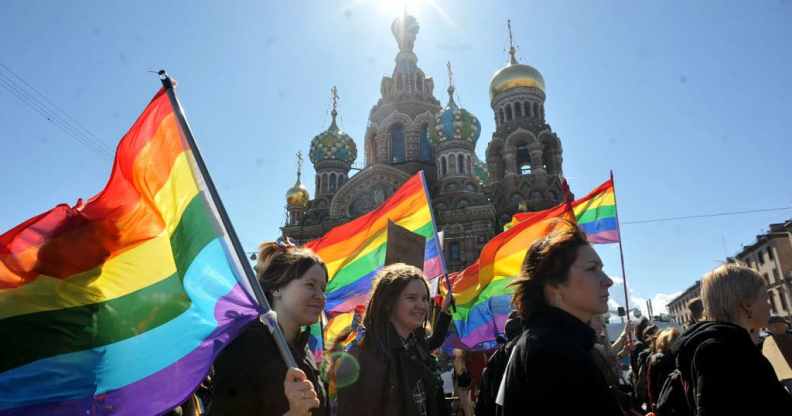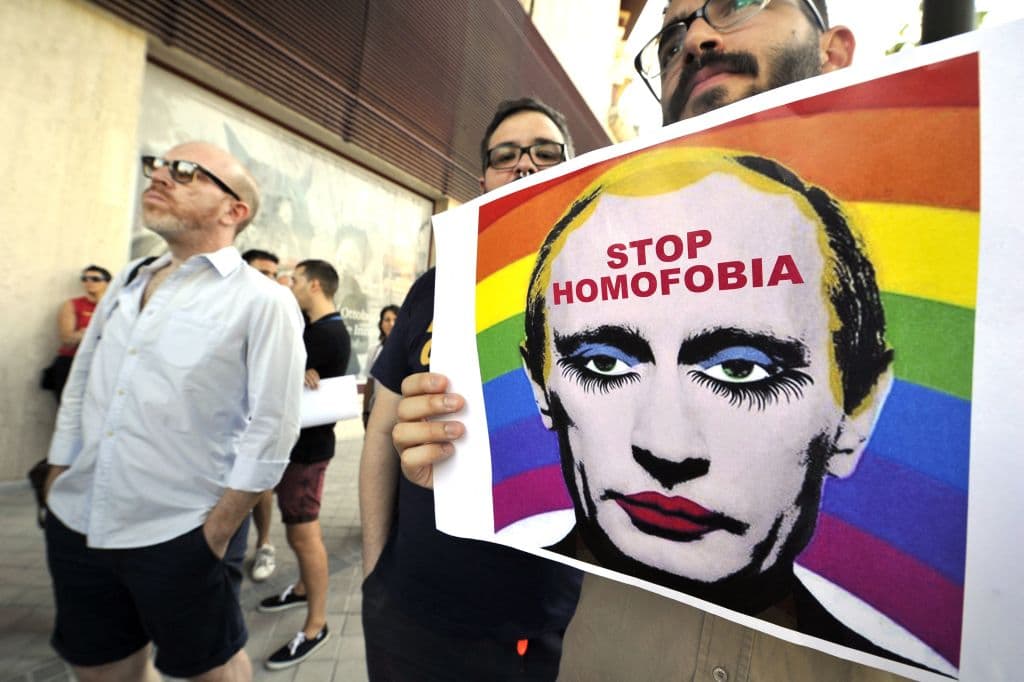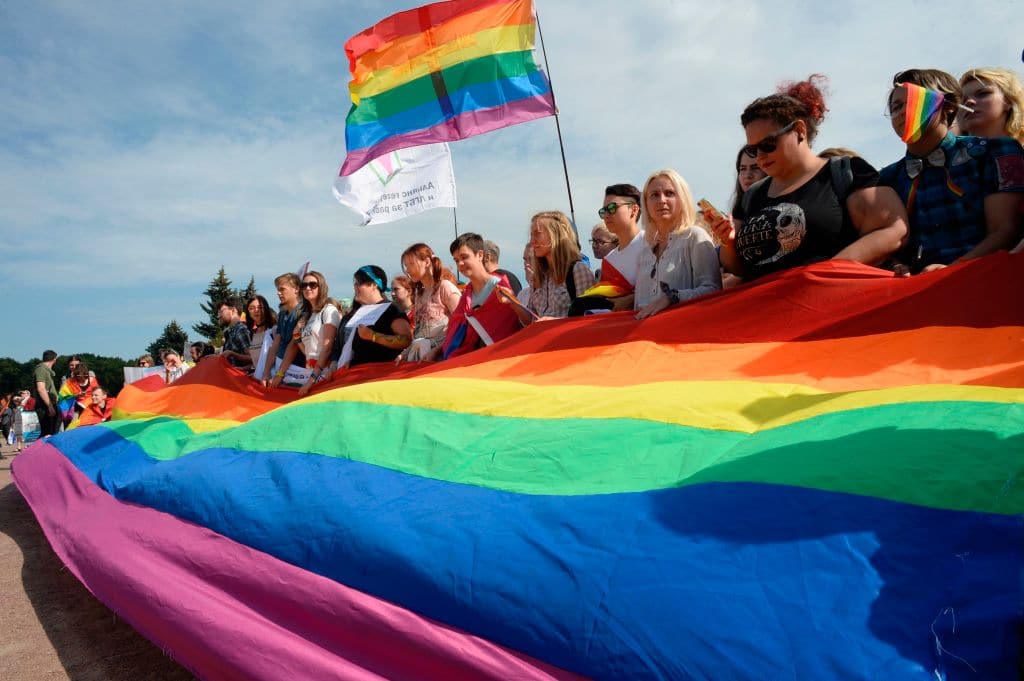LGBT+ Russians live in fear of Putin’s next deadly move – but fleeing isn’t so easy

Gay rights activists march in Russia’s second city of St. Petersburg May 1, 2013. (OLGA MALTSEVA/AFP via Getty)
Putin’s war in Ukraine is part of a mission to turn back the clock to the Soviet era – a prospect that terrifies LGBT+ Russians.
Maria, an LGBT+ activist in Russia whose name has been changed to protect her identity, says queer people have been fleeing her country since Putin launched his invasion of Ukraine – which many agree is all part of a terrifying quest to bring Russia back to its former dominance.
That vision, she says, does not include LGBT+ people.
When Maria speaks to PinkNews over Zoom, she’s quick to describe Russia’s actions in Ukraine as a war. That shouldn’t come as a surprise – it is a war, but Russia has remained adamant that it’s a “special operation”. The government is so committed to that lie that it’s even made calling it a war a crime punishable by up to 15 years in prison.
“According to Russian law, we are required to call it a ‘special operation’,” Maria says with palpable anxiety. “If we talk about real human casualties, it’s treason.”
That’s why Maria doesn’t want to use her real name. She knows that speaking out is the morally right thing to do, but she also knows that queer Russian people are counting on her to be there to help them. She needs to protect herself.
Russia banned what it called “gay propaganda” in 2014, which prohibits the “promotion” of homosexuality. It wasn’t the first – or last – government attack on LGBT+ people. In 2020 Russia attempted (but failed) to legally erase trans people. The following year it solidified a ban on same-sex marriage. Violence against LGBT+ people is widespread, and Russia has been complicit in the so-called gay purges in Chechnya, in which dozens have been abducted, tortured and killed.
Still, activists like Maria have stayed put, working hard to change society and to bring about a better tomorrow for queer Russians.
But within the community, hope for change is dwindling as the war in Ukraine rages on.
“I think LGBT+ people recognise that, if the system is getting oppressive, that probably means they’re going to come after minority groups, vulnerable groups,” Maria explains. “We don’t know if tomorrow we’re going to wake up in a world where it’s back to before the 90s where LGBT+ relations are punishable by the law and criminal again. I think people are fearful of that and that’s why they’re leaving.”

A demonstrator holds a poster depicting Russian President Vladimir Putin with make-up. (GERARD JULIEN/AFP via Getty)
The problem is that many are leaving in a state of panic, meaning they’re not putting in place the right supports beforehand.
“They don’t know that, for example, once they leave Russia, their Russian bank cards are not going to work, so they’re without money and they’re away from their financial resources and they don’t know where to go,” Maria explains. “Even if you leave the country, if you have no registration someplace else, if you have no nationality of another country, the most you can stay someplace is three months, half a year – what’s next?”
The situation has become so bad that Maria is considering setting up a shelter for LGBT+ Russians who are fleeing the country abroad – however, most of her efforts right now are focused on helping LGBT+ Ukrainians.
She’s starting to wonder how she can continue her work in Russia and how she can continue to advocate for her community in a country that is increasingly oppressive.
“At times I feel desperate because I don’t believe it’s possible to be an LGBT+ activist in Russia anymore,” she says.
She knows other activists who have already fled because their partners are male and they fear that they could be drafted to fight in a war they oppose. “They felt it necessary to leave the country so they don’t serve the aggressive regime.”
Russian propaganda is obscuring the truth about Ukraine
The entire thing is made even more complicated by just how sophisticated Russian propaganda is. The free media has been stifled in the country, and most people take at face value the state-sanctioned information they’re receiving.
The country has now been blocked from accessing Facebook and Instagram, meaning reliable information is even harder to come by for Russian people. Because most people are consuming propaganda, many are under the illusion that Russia is “protecting” the Ukrainian people, Maria explains.
“Most of the Russian population thinks that we’re not harming anyone who’s peaceful, that there are no human casualties, that the Russian military is only targeting military objects in Ukraine and that this is all with the good intention of ‘freeing’ the people of Ukraine of ‘nationalistic’ and ‘pro-Nazi’ people,” she says. “It sounds so twisted it’s almost unbelievable, but that’s what people think.”

People wave gay rights’ movement rainbow flags during the gay pride rally in Saint Petersburg, on Agust 12, 2017. (MALTSEVA/AFP via Getty)
While Maria was shocked by the invasion – most people were, she says – with hindsight, she can see that it’s been a long time coming. For years, the Russian government has been working to bring the country back to a bygone era. The goalposts were clearly set when Russia banned “gay propaganda”. The government’s commitment to “traditional values” is intrinsically inked to Putin’s view that Russia has a rightful claim to Ukrainian territory.
“It’s this idea of, we are our own people, we have our own values, and we don’t need your values and democratic institutions. Going against International norms and regulations in this war against Ukraine is also part of it,” Maria continues. “Russia doesn’t care anymore – it has its own rules.
“The Kremlin is building this Russian values rhetoric, this anti-western rhetoric, and to set it apart from the rest of the world – to say, we’re different from the west, we follow our own values, we don’t have to be like the rest of them.”

